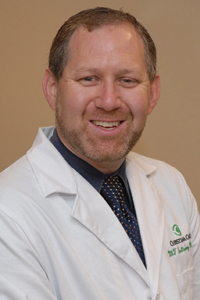Clinical trial explores gene-replacement therapy to slow progression of heart failure


Christiana Care Health System is part of an elite group conducting a groundbreaking clinical trial to learn if gene-replacement therapy can dramatically slow the progression of heart failure.
If successful, genetically targeted therapy would be the a major advance in the treatment of heart failure, says Mitchell Saltzberg, M.D., medical director of the Heart Failure Program at Christiana Care’s Center for Heart & Vascular Health and the principal investigator for the study at Christiana Care.
The “Calcium Up-Regulation by Percutaneous Administration of Gene Therapy In Cardiac Disease” or CUPID Phase 2b Trial is the largest study of its kind and the first-ever cardiac genetic trial in Delaware. Approximately 25 institutions in the United States and Europe are participating.
“It is exciting that there is a possibility to improve outcomes for many heart-failure patients with a novel gene-therapy approach,” Dr. Saltzberg said. “Heart failure is a very expensive progressive disease, and we are hoping this trial will represent a big step forward in finding more effective treatments.”
Heart failure exacts a staggering toll in both human suffering and health care costs. In the U.S., 5 million people have heart failure, with more than 500,000 new cases diagnosed each year. In patients over age 65, heart failure is the leading cause of hospitalization.
In the trial, genetic material is stripped from a virus to remove any possibility of infection. Then, new DNA material is inserted into the virus, and the virus is injected directly into the arteries that feed blood to the heart. The virus attaches to the heart-muscle cells and injects the DNA material, and this DNA turns on a protein that controls the way calcium is handled inside the heart-muscle cell.
Calcium controls the contractions of the heart muscle; the goal is to make contractions stronger. The treatment, called Mydicar, is delivered directly to the heart via a standard cardiac catheterization.
Preliminary results show that patients with heart failure who receive genetically targeted enzyme-replacement therapy fare far better than patients who receive a placebo. Their risk of death, hospitalization or the need for a heart transplant or left ventricular assist device (LVAD) declined 88 percent.
Further, many patients with advanced heart failure were stabilized, while patients who received the placebo continued to decline.
The study focuses on men and women age 18-80 with heart-failure symptoms despite medical therapy, reduced heart-muscle function and either a qualifying hospital admission within the past six months or two outpatient medical interventions for worsening symptoms. Patients may also qualify if they have elevated heart stress hormone levels, which are measured using a simple blood test.
Statistically, about 50 percent of patients have a high level of antibodies in their blood and can’t be included in the trial.
“Our target is to screen as many people as we can to see if they qualify,” Dr. Saltzberg says.
The trial is scheduled to run through January 2016.